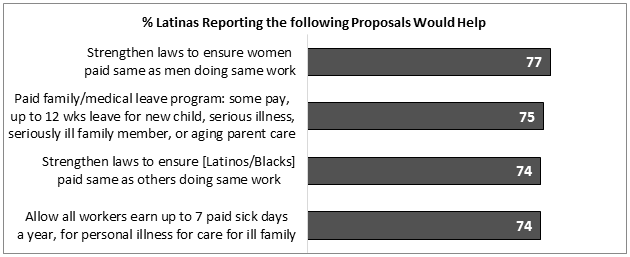Poll: 61 percent of Latino voters more likely to vote for a candidate in 2014 who votes to stop the cuts
WASHINGTON, D.C.—With a bipartisan budget agreement announced earlier this week, Latino voters are closely watching lawmakers on Capitol Hill to see whether they can finally pass a budget that offers much-needed relief from the painful cuts brought about by sequestration. A new national survey released today by NCLR (National Council of La Raza) and Latino Decisions shows that Hispanic voters are dissatisfied with the handling of federal budget policy by lawmakers on both sides of the aisle. However, members of Congress who vote to end the sequester cuts stand to gain significant support among the Latino community. [Full poll results posted here]
According to the survey of registered Latino voters, neither of the two parties get a passing grade from Latinos. Only 27 percent of Latino voters approve of the job Republicans in Congress are doing to handle the federal budget, while 63 percent disapprove. Democrats have fared somewhat better, with 48 percent approval and 42 percent disapproval.
Both groups have a chance to turn these numbers around. The survey found that 61 percent of Latino voters are more likely to vote for a member of Congress who supports stopping the cuts and restoring funding for government programs, more than double the 26 percent who said that this would make them less likely to vote for the candidate.
“Jobs and the economy remain a top priority for Latino voters one year after the presidential election,” said Eric Rodriguez, Vice President, Office of Research, Advocacy and Legislation, NCLR. “The poll shows that deficit reduction is important but that both Democratic and Republican Hispanic voters value investments in education and preschool. These voters intend to support leaders in 2014 who stop cuts in these areas and address our job creation and economic growth needs.”
Regardless of party affiliation, Latino voters staunchly reject a federal budget policy that emphasizes deeper cuts to programs. Overall, 86 percent of Latinos are concerned about the automatic sequester cuts, including 71 percent of Latino Republicans, with the greatest concerns being for cuts to preschool education (91 percent concerned), college assistance (88 percent) and job training programs (86 percent). An overwhelming 96 percent of Latinos would rather see investments in infrastructure and education to stimulate the economy. Support for increased investments is strong among both Latino Democrats (99 percent) and Latino Republicans (95 percent).
“This new survey makes clear that Latino voters overwhelming reject the automatic sequester cuts. Latinos know that these cuts are hurting our community, and they want to see Congress pass a responsible budget deal that restores funding to important programs and stops the cuts. Hispanic voters are watching the budget debate closely and this issue will figure prominently in their evaluation of congressional candidates in 2014,” said Dr. Matt A. Barreto, Co-Founder of Latino Decisions, who oversaw the poll for NCLR.
For more information please contact Joseph Rendeiro, NCLR, at (202) 776-1566 or [email protected], or Matt Barreto, Latino Decisions, at (909) 489-2955 or [email protected].
The entire poll results can be found online at NCLR_Budget_Toplines.pdf
About the poll. Latino Decisions interviewed 800 total Latino registered voters nationwide from December 1 to 8, 2013. Respondents were interviewed in English or Spanish, at their discretion, by fully bilingual interviewers. The overall survey contains a margin of error of +/– 3.5 percent, and on split sample items (n=400) the margin of error is +/– 4.9 percent. The survey questions and sampling process were designed by Dr. Matt Barreto and Dr. Gary Segura, co-founders of Latino Decisions. Respondents were reached through a mix of landline telephones, cell phones and the Latino Decisions web panel.
NCLR—the largest national Hispanic civil rights and advocacy organization in the United States—works to improve opportunities for Hispanic Americans. For more information on NCLR, please visit www.nclr.org or follow us on Facebook and Twitter.


